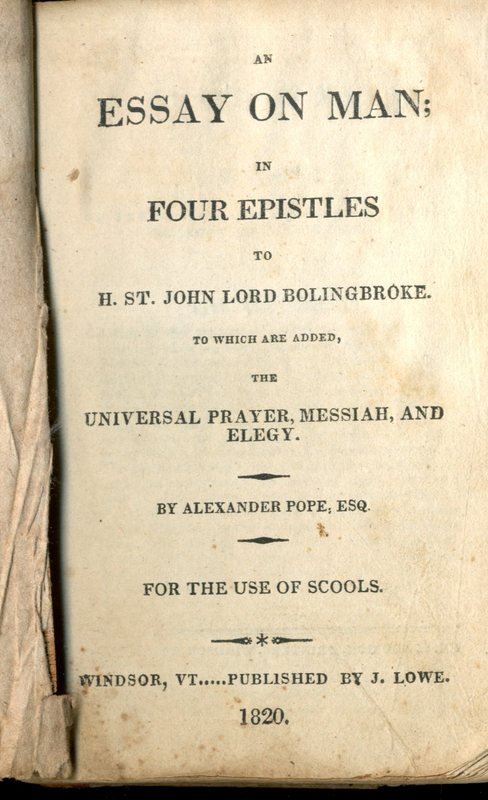The Essay on Man is a philosophical poem, written in heroic couplets written by Alexander Pope and published between 1732 and 1734. Pope intended this poem to be the centrepiece of a proposed system of ethics that was to be put forth in poetic form. It was a piece of work that Pope intended to make into a larger work; however, he did not live to complete it.
The poem is an attempt to "vindicate the ways of God to Man," a variation on Milton's attempt in Paradise Lost to "justify the ways of God to Man". It challenges as prideful an anthropocentric world-view. The poem is not solely Christian; however, it makes an assumption that man has fallen and must seek his own salvation.
It consists of four epistles that are addressed to Lord Bolingbroke. Pope presents an idea on his view on the Universe; he says that no matter how imperfect, complex, inscrutable and disturbing the Universe appears to be, it functions in a rational fashion according to the natural laws. The natural laws consider the Universe as a whole a perfect work of God. To humans it appears to be evil and imperfect in many ways; however, Pope points out that this is due to our limited mindset and limited intellectual capacity. Pope gets the message across that humans must accept their position in the "Great Chain of Being" which is at a middle stage between the angels and the beasts of the world. If we are able to accomplish this then we potentially could lead happy and virtuous lives.
The poem is an affirmative poem of faith: life seems to be chaotic and confusing to man when he is in the center of it, but according to Pope it is really divinely ordered. In Pope's world, God exists and is what he centres the Universe around in order to have an ordered structure. The limited intelligence of man can only take in tiny portions of this order and can experience only partial truths, hence man must rely on hope which then leads into faith. Man must be aware of his existence in the Universe and what he brings to it, in terms of riches, power and fame. It is man's duty to strive to be good regardless of other situations: this is the message Pope is trying to get across to the reader.
http://en.wikipedia.org/wiki/Alexander_Pope
http://en.wikipedia.org/wiki/An_Essay_on_Man
Alexander Pope (1688 – 1744) was an 18th-century English poet. He is best known for his satirical verse, as well as for his translation of Homer. Famous for his use of the heroic couplet, he is the second-most frequently quoted writer in The Oxford Dictionary of Quotations, after Shakespeare.
http://www.victorianweb.org/previctorian/pope/bio.html
